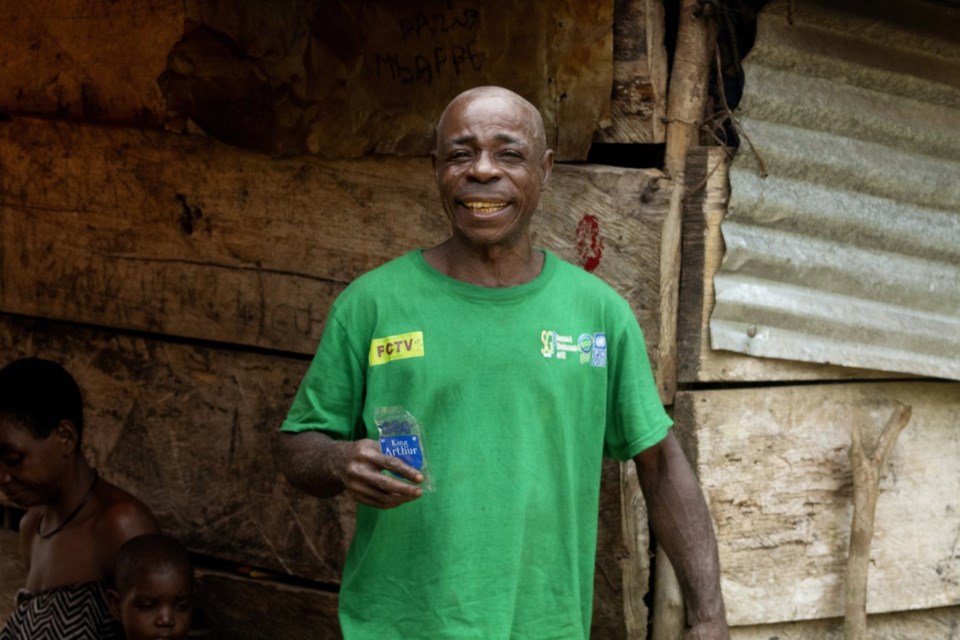MAYOS, Cameroon (AP) — The morning sun filtered through the forest canopy, casting dappled light on this village in Cameroon. For the Baka Indigenous community, it was a timeless image.
But a passing truck broke the silence and stirred up billows of dust, a reminder that the Baka now live an uneasy life along roadsides after being forced from their traditional homes.
The Baka and fellow Indigenous Bagyieli have lived in harmony with the forests of central Africa for generations. But mining and logging activities are encroaching, along with conservation areas, and government policy aims to integrate the ethnic groups into mainstream society.
Lives “were better when we were in the forest," said Rebecca Gwampiel, a 78-year-old Baka. She prepared yam porridge in front of a traditional hut constructed with arched saplings. In the dusty courtyard, children played football using bound banana leaves.
Among them was Francis, an 11-year-old who has quickly adapted to the new life and has aspirations. “I want to become a nurse,” he declared. “I want to be able to treat my grandmother when she is sick."
But for many Baka children, such dreams go unfulfilled. Their lack of birth certificates poses a significant barrier — part of a . They never saw the need for birth certificates when they barely interacted with the world beyond the forest. Even now, they live far from administrative centers and can rarely afford the transport to reach them.
“Without a birth certificate, he is stuck with me here in the village,” said Francis’ 61-year-old father, Bertrand Akomi. He himself was denied employment by a lumber company because he didn't have a birth certificate.
The document remains elusive for the more than 120,000 members of Cameroon's Baka and Bagyieli communities. Without birth certificates, they cannot obtain national identity documents and are excluded from the full benefits of citizenship.
“When births are not registered, how can you identify yourself as Cameroonian?” asked Banmi Emmanuel Dingha, chairman of the Foreign Affairs Committee of Cameroon’s National Assembly, calling the document crucial for accessing education, healthcare and employment opportunities.
There is hope for change. Earlier this summer, Dingha and colleagues in the Cameroon parliament passed a bill allowing the country to accede to two United Nations conventions relating to the recognition of stateless people.
That would “help to significantly reduce discrimination against persons who often are only victims of circumstances,” the government said at the time.
Cameroon’s actions are part of a commitment by African nations earlier this year to address the right to nationality and eradicate statelessness on the continent of more than 1.3 billion people.
The Indigenous people of Cameroon are mostly hunters and gatherers who are long used to easily crossing lightly guarded international borders in search of food and game.
“The Bakas are not only in Cameroon. You find them in Congo, you find them in the Central African Republic, you find them in Gabon and you find them in Equatorial Guinea. And many of them move across forests that straddle all these countries,” Dingha said.
Sebastian Bissolababa, a teacher at a government school in Mayos, emphasized the urgency. Many Baka students can't move on to secondary education or beyond, and companies often require identification papers, closing another route to integration into society.
The Indigenous Bagyieli, who live some 590 kilometers away in the southern Campo region, face similar challenges.
There, Henri Lema of Nazareth village was returning from hunting, with a porcupine dangling from his spear. He joined his wife, Bilore Marie, in preparing the evening meal.
As he sliced the porcupine, he expressed frustration with the lack of identification documents and the trouble it causes with paramilitary forces and other authorities.
“Each time I have to travel to Kribi (the district administrative headquarters), gendarmes disturb me because I don’t have an ID card," he said. "I have to pay a bribe each time. And that’s money I don’t even have."
Simplice Nguiamba is a senior government official in charge of, among other things, ensuring that the Bagyelis in Campo have access to nationality documents.
“In concrete terms, our actions are based on raising awareness, doing advocacy, monitoring and support for Bagyelis," he said.
Several other groups of Cameroonians also have risked statelessness.
The ongoing separatist crisis in the country's English-speaking North West and South West regions, and the Boko Haram insurgency in the Far North region, have triggered internal displacement, resulting in the loss of birth certificates and national identity cards for many people.
___
For more news on Africa and development:
___
The Associated Press receives financial support for global health and development coverage in Africa from the Gates Foundation. The AP is solely responsible for all content. Find AP’s for working with philanthropies, a list of supporters and funded coverage areas at .
Ngala Killian Chimtom, The Associated Press




